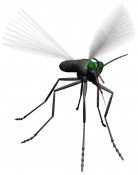The Mississippi Department of Health is reporting a second death from the mosquito-borne West Nile Virus this summer, highlighting the fact that this well-known virus is more dangerous than the wide-spread (and over-hyped) swine flu. The department released information about this second death, in Forrest County, Friday. To date, the state agency reports 17 cases of West Nile and two cases of St. Louis encephalitis, also spread by mosquitoes.
Last year, three Mississippians died from West Nile out of a total of 65 confirmed cases. To date, the MSDH has confirmed 365 cases of swine flu with one death, a Jackson County child with multiple underlying health issues, in the state.
For healthy people, the risk of contracting West Nile from a mosquito bite is low, and most people who get bitten by an infected mosquito never develop symptoms. In more serious infections, patients experience common flulike symptoms: headache, body aches, fever, nausea and vomiting. Severe cases progress to seizures, paralysis, coma and possibly, death. If you experience flulike symptoms during the summer months, health officials recommend seeing a doctor immediately.
All of the deadly mosquito-borne illnesses in the U.S.which include equine encephalitisaffect humans and animals, especially birds. Birds are highly susceptible to West Nile, especially blue jays and crows, and dead birds are an early warning that infected mosquitoes could be present. The MSDH asks that you report dead birds by calling the West Nile hotline at 1-877-WST-NILE (1-877-978-6453).
Mosquitoes breed in standing water, so disposing or cleaning out areas where water collects is key to prevention. Also, health officials urge using an effective repellent with DEET when outdoors, especially at dawn and dusk when mosquitoes are most active.
For additional information on mosquito-borne illnesses, including prevention and protection tips, and information on birds, go to the MSDH Web site.



Comments
Use the comment form below to begin a discussion about this content.